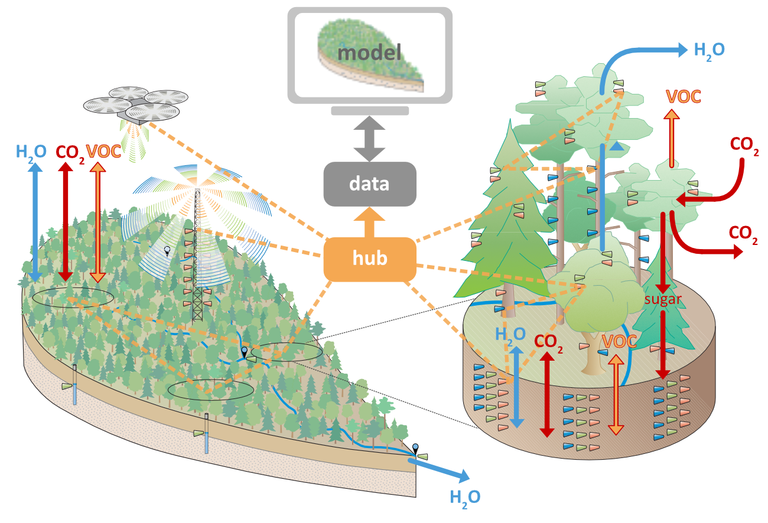ECOSENSE (SFB 1537) - Multi-scale quantification and modelling of spatio-temporal dynamics of ecosystem processes by smart autonomous sensor networks
Link -> ECOSENSE Homepage

Global climate change threatens ecosystem functioning worldwide. Forest ecosystems are particularly important for carbon sequestration. However, recurrent stresses, such as heat waves, floods, and droughts, increasingly endanger even central European forests, with potentially cascading effects on their carbon sink capacity, drought resilience, and sustainability. Knowledge on the impact on the multitude of processes driving soil-plant-atmosphere interactions within these complex systems is widely lacking and uncertainty about future changes extremely high. Thus, forecasting forest response to climate change will require an improved process understanding of carbon and water cycling across various temporal and spatial scales, from minutes to seasons, from leaves to ecosystem, covering the atmosphere, biosphere, pedosphere and hydrosphere. Many relevant processes occur at small scales and high spatial heterogeneity and their interactions and feed-back loops can be key players to amplify or dampen a system’s response to stress. Currently, we are lacking the appropriate measuring, data and modelling tools allowing for comprehensive, real time quantification of relevant processes at high spatio-temporal coverage. Moreover, climate impacts are highly unpredictable, and thus future research will require novel mobile, easy deployable, and cost- efficient approaches. Our interdisciplinary research project ECOSENSE will investigate all relevant scales in a next generation ecosystem research assessment. Our vision is to detect and forecast critical changes in ecosystem functioning based on the understanding of hierarchical process interaction. To do so ECOSENSE will develop, implement, and test a new versatile, distributed, cost-effective, autonomous, intelligent sensor network based on novel microsensors tailored to the specific needs in remote and harsh forest environments. Theywill measure the spatio-temporal dynamics of ecosystem states and fluxes in a minimally invasive manner in naturally complex structured forests. Measured data will be transferred in real-time into a sophisticated database which can be explored for process analysis, deep learning approaches, and enhanced simulation models for now- and forecasting applications. ECOSENSE will open new horrizons for integrative ecosystem research by i) identifying hierarchies and interactions of abiotic and biotic processes of forest carbon and water exchange, ii) provide a profound understanding of complex ecosystem responses to environmental stressors enabling the iii) prediction of process-based alterations in ecosystem functioning and sustainability. Our novel ECOSENSE Toolkit, tested and validated in controlled climate extreme experiments, and our ECOSENSE Forest, will open new horizons for rapid assessment in vast and remote ecosystems.
Speaker:
Christiane Werner and Ulrike Wallrabe
Coordination:
Julian Müller (julian.muellerATecosense.uni-freiburg.de)
Nina Stobbe (nina.stobbeATecosense.uni-freiburg.de)
Main Homepage:
Open positions
Currently there are no open positions in ECOSENSE.
ECOSENSE is structured in three main Research Areas including a Central Project and a Research Training Group
More information about the Research Areas and open positions within can be accessed by clicking on the links:
Research Area A – Water, carbon and volatile organic compound (VOC) fluxes along the different ecosystem compartments and across scales
Research Area B - Active chlorophyll fluorescence measurements as a sensitive stress parameter addressing the relevance of microclimatic heterogeneity
Research Area C - Intelligent sensor network, robustness, data management, ecosystem model, and deep‑learning
Z-projects and RTG – Common infrastructure, administration and Research Training Group (RTG)
Partner:
University of Freiburg
|
Faculty of Environment and Natural Resources |
||
| Environmental Meteorology | Prof. Dr. Andreas Christen | |
| Biometry and Environmental System Analysis | Prof. Dr. Carsten Dormann | |
| Remote Sensing and Landscape Information Systems | Prof. Dr. Barbara Koch, Dr. Anna Göritz | |
| Soil Ecology | Prof. Dr. Friederike Lang, Dr. Helmer Schack-Kirchner | |
| Hydrology | Prof. Dr. Markus Weiler | |
| Ecosystem Physiology | Prof. Dr. Christiane Werner, PD Jürgen Kreuzwieser, Dr. Simon Haberstroh | |
| Faculty of Engineering | ||
| Department of Microsystems Engineering (IMTEK) | ||
| Design of Microsystems | Prof. Dr. Peter Woias, Dr. Laura Comella | |
| Chemistry and Physics of Interfaces | Prof. Dr. Jürgen Rühe, Dr. Oswald Prucker | |
| Electrical Instrumentation and Embedded Systems | Prof. Dr. Stefan J. Rupitsch, Prof. Dr. Leonhard Reindl | |
| Gas Sensors | Prof. Dr. Jürgen Wöllenstein, Dr. Katrin Schmitt | |
| Microactuators | Prof. Dr. Ulrike Wallrabe | |
| Department of Sustainable Systems Engineering (INATECH) | ||
| Large-Scale Structures | Prof. Dr. Alexander Reiterer | |
Karlsruhe Institute of Technology (KIT)
|
Department of Mechanical Engineering |
||
| Institute of Microstructure Technology | Prof. Dr. Jan Korvink, Dr. Mazin Jouda | |
| Department of Physics |
||
| Institute of Meteorology and Climate Research | PD Dr. Ralf Kiese, Dr. habil. Rüdiger Grote | |
More Information:
Press Release University of Freiburg
Publications
-
Comella, Laura Maria; Bregler, Florian; Hager, Eiko; Anys, Markus; Klueppel, Johannes; Rupitsch, Stefan J.; Werner, Christiane; Woias, Peter (2022). Estimation of leaf area index with a multi-channel spectral micro-sensor for wireless sensing networks. Sensors, 22(13), 5048; DOI: 10.3390/s22135048
-
Reimer, Julian; Stöcklin, Sebastian; Comella, Laura M.; Woias, Peter; Werner, Christiane; Reindl, Leonhard; Rupitsch, Stefan J. (2021). An autonomous and wireless pulse-amplitude modulated chlorophyll fluorometer. tm - Technisches Messen, 88(12), 773-784. DOI: 10.1515/teme-2021-0104

